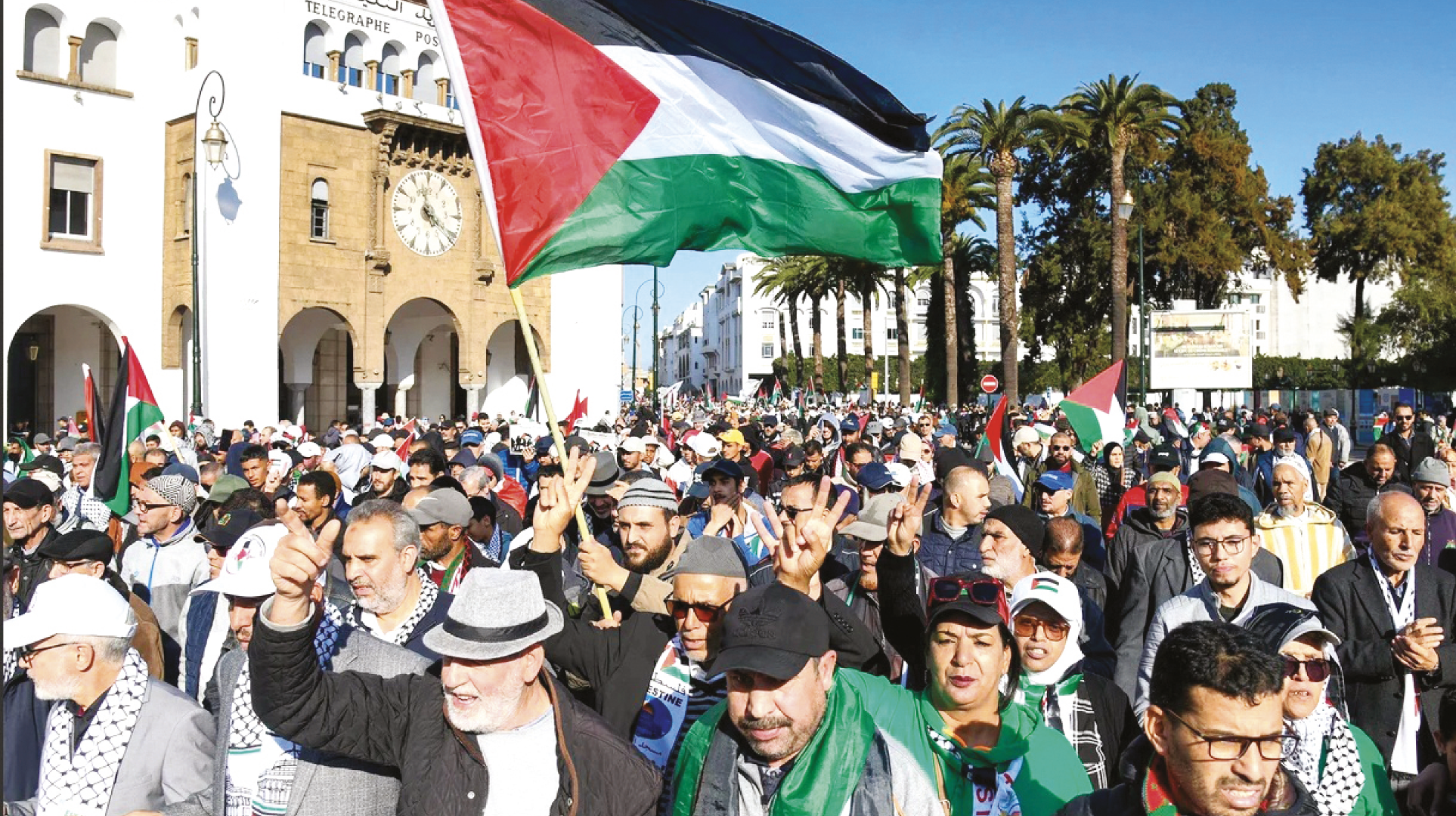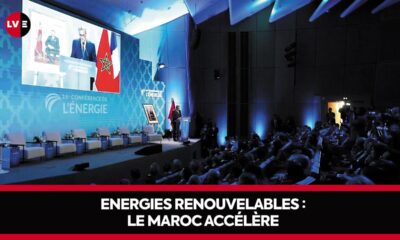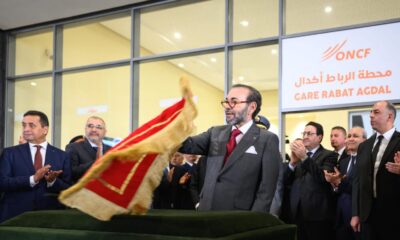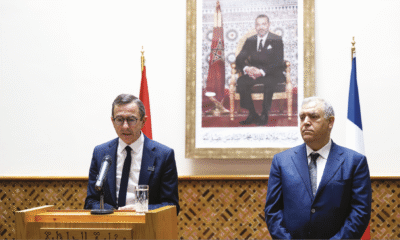Influences
What If the Pro-Gaza Protests in Morocco Are Being Instrumentalized?
November 2024: A protest was organized near the port of Tanger Med, fueled by fake news. Nearly six months later, the same fake news sparked two sit-ins in Casablanca and Tangier. Morocco’s interests are being targeted. Analysis.
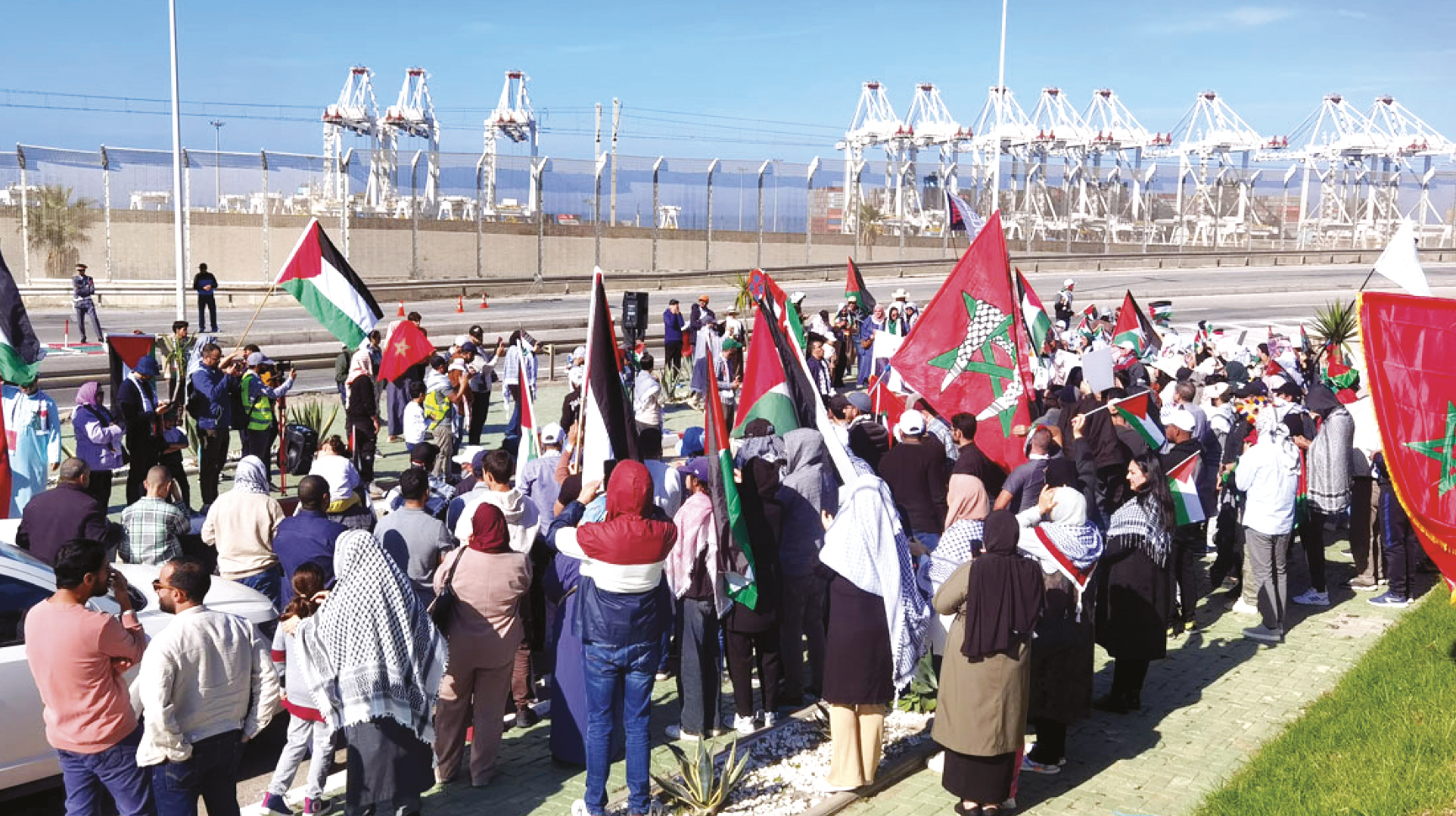
A protest against “the possibility of docking” for two commercial ships “likely carrying what is possibly military equipment potentially destined for Israel.” This is not fiction but a reality we witnessed in Morocco, in Casablanca and Tangier, late last week.
It all began with a report on Al Jazeera, which claimed “according to rumors” that two vessels, Nexoe Maersk and Maersk Detroit, transporting components for F-35 fighter jets, were likely to dock at the port of Casablanca, then at Tanger Med, before continuing to the port of Haifa, Israel.
The Nexoe Maersk was first scheduled to dock in Casablanca on April 18 before heading to Tanger Med. Then came full mobilization, based on fake news.
The two main factions of Morocco’s political Islam movement, which divided roles between them—Al Adl Wal Ihsane and the Moroccan Front for Supporting Palestine and Against Normalization, alongside its former radical leftist partners—gathered outside the port of the economic capital (Casablanca). Meanwhile, the PJD-MUR, through its union arm, the UNTM, and its “Moroccan Initiative for Support and Solidarity,” set its sights on Tanger Med.
The mobilization even drew in some unions: the CDT, for obvious reasons, and surprisingly the UMT, both of which urged their members to “refuse any handling operations related to the two ships.”
Behind the stated intention of advocating for Middle East peace lies what appears to be a project to sabotage the national economy by targeting its logistics crown jewel, Tanger Med, and its strategic nerve center, the port of Casablanca. By attacking these ports, major economic interests of the country are being undermined.
This is not the first time. Last year, a similar fake news story sparked a protest at Tanger Med over claims that another Maersk container ship, the Maersk Denver, was docking to transport weapons to Israel. It later emerged that the allegations were false, the ship’s destination was different, and the protesters gathered on November 10, 2024, near the port had been instrumentalized.
At the time, the PJD even called for a public inquiry into the ship’s cargo. And as it did in November 2023, the Qatari channel recently issued a categorical denial of the claims it had previously circulated about the two Danish shipping company’s vessels.
Commercial Rivalry
But why repeat the same “mistake” twice? Over the past year and a half, everyone has witnessed how the two Islamist movements, alongside the radical left, have continued organizing marches and sit-ins—together or alternately—primarily in Tangier and Rabat, and more recently in several other cities, in support of Gaza.
Throughout this period, and to this day, no one has raised objections. Such actions fall under the freedom of expression and assembly guaranteed by law and the Constitution, provided they remain within legal boundaries. However, this changes when protesters openly target economic interests, or any national interests, by blockading ports and demanding “an end to normalization” with Israel—a scenario widely agreed to overstep legal limits.
This raises legitimate questions about whether recent protests are truly motivated by solidarity with Palestine or driven by other agendas. Some analysts boldly link this new wave of demonstrations to shifting geopolitical and geo-economic dynamics in the region. Two key theories have emerged so far.
The first revolves around Qatar’s growing ambitions in global commerce. Amidst its ongoing crisis with Gulf states enforcing an economic blockade, Qatar has sought to pivot. On November 30, 2017, it launched QTerminals at Hamad Port to manage containerized and non-containerized cargo (general goods, bulk, Ro-Ro, livestock, offshore supplies).
By late 2023, QTerminals Group and Qatar Navigation secured a majority stake (90%) in Germany’s Kramer Holding, operator of Rotterdam’s Delta Container Services (DCS) and Rotterdam Container Terminal (RCT) on the Maasvlakte. Its main competitor is APM Terminals, a wholly-owned subsidiary of Maersk. Notably, protesters at Tanger Med and Casablanca—fueled by Al Jazeera’s false claims—have singled out two Maersk-owned vessels. Coincidence? Unlikely, given the timing: the protests followed Qatar’s announcement of a new maritime trade route connecting it to Algeria via Egypt and Libya in the Mediterranean.
This route coincides with major port infrastructure projects, such as the expansion of Algeria’s Jijel Port, aimed at bolstering the country’s position as a “commercial hub in North Africa.” Sic. Last May, Qatar also expressed interest in collaborating with Russia on the International North-South Transport Corridor (ITC), a 7,200-kilometer multimodal route linking St. Petersburg to Mumbai. Meanwhile, in August 2023, Maersk—via APM Terminals—opened a 225,000-square-meter logistics facility in Jeddah, Saudi Arabia. These moves underscore a deepening rivalry between the two entities in MENA and Europe.
Some might dismiss this as conflating corporate competition with attacks on a nation’s economy. Yet, despite this tension, Morocco and Qatar’s bilateral relations remain unaffected—even flourishing. If anything, the real battle lies in navigating regional alliances and economic clout, where commercial ambition and geopolitical strategy increasingly intertwine.
Stalling Development
This lends credence to the second hypothesis raised by many analysts, who urge revisiting events from a few years back—specifically 2020.
In November of that year (a date unrelated to the El Guergarate operation), the influential German Institute for International and Security Affairs (Stiftung Wissenschaft und Politik) drafted a report, later made public, urging the European Union to “curb Morocco’s hegemony in Africa, particularly vis-à-vis its Maghreb neighbors.” The report described Morocco as “the Maghreb state with the most sophisticated sub-Saharan policy.”
Its authors argued that Morocco’s motivations included “access to attractive growth markets in Africa, frustration over restricted access to Europe, stalled Maghreb integration, and the desire for international recognition of Western Sahara as Moroccan.” The context of the report’s release is widely understood.
The directive was clear: stall Morocco’s economic emergence and regional influence. What happened next, on December 20, 2020, caught many off guard. Morocco signed a trilateral agreement with the U.S. and Israel, securing Washington’s recognition of Moroccan sovereignty over the Sahara and paving the way for expanded cooperation, notably in defense. The backlash was swift: the Pegasus scandal (July 2021), the European Parliament corruption affair (December 2022), and the CJEU’s ruling in October 2024…
Undeterred, Morocco pressed forward. Since then, the Kingdom has significantly bolstered its military and deterrent capabilities. Following the U.S., other major states—including Spain and France—have recognized Moroccan sovereignty over the Sahara, while over 110 countries now endorse the Autonomy Plan.
The catalyst for this unprecedented momentum remains the trilateral agreement, which critics of Morocco’s vital interests now seek to dismantle. By targeting “normalization” between Morocco and Israel under the guise of supporting Palestine, they aim to undermine the accord itself.
As everyone knows, the agreement is a package deal: if one commitment falters, all clauses collapse. This would undo years of Moroccan diplomatic efforts to resolve the artificial conflict over the Sahara and abruptly halt the nation’s development drive.
Today, port logistics stand as a cornerstone of Morocco’s growth, with the upcoming launch of Nador West Med this year and Dakhla Atlantique in two years. The Kingdom also lies at the heart of multiple maritime corridors linking East-West and North-South trade routes.
This analysis isn’t rooted in conspiracy theories. The facts speak for themselves: Morocco’s rise as a maritime power and global trade nexus is underway. Yet severing ties with Israel—a partner in multiple agreements, including a landmark security cooperation pact—risks destabilizing its strategic partnership with the U.S. and jeopardizing decades of progress.
Morocco-Qatar: Official Relations
In early 2023, Morocco and Qatar concluded the second round of talks on their free trade agreement (FTA), an initiative designed to accelerate trade growth by fostering cooperation between businesses in both countries. These negotiations, held in Doha, followed an initial round hosted in Rabat the previous year.
Through the FTA, the two nations aim to boost trade and services to achieve deeper economic integration. Rabat and Doha have both expressed commitment to strengthening bilateral cooperation across sectors, from commerce to cybersecurity.
This builds on earlier collaboration: in September 2022, they signed a joint declaration on information-sharing for the 2022 World Cup. In 2018, the countries inked 11 agreements and memoranda of understanding (MoUs) spanning areas such as agriculture and trade—laying the groundwork for today’s economic partnership.
